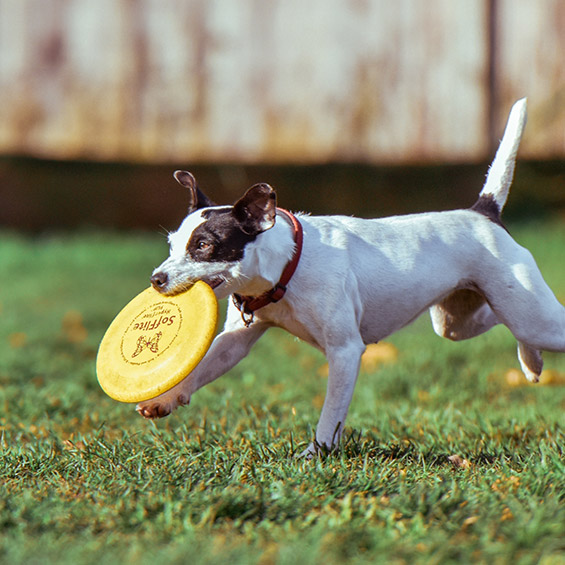
Tips to Maintain Your Pet's Joint Health
by VitaPaws
17/05/2017
We all think of our four legged friends as being constant bundles of energy springing up to go for a walk and madly running around the house in excitement. In truth however, our pets, just like us, slow down a little as they get older and their joints can become a little stiffer and more painful due to a number of different issues. In order to ensure our pets get the most active and healthy life possible, there are a number of things we can do to ensure our pets' older years are free from pain, and below are a few examples of things we can do to maintain our pet's joint health.
Weight Management
Weight management can play a major role in the quality of our pet's lives. Being overweight or obese can put excess pressure on the joints, causing discomfort, stiffness and damage in the long run leading to your pet being in pain as it gets older. If your pet is overweight there are a number of things you can do to help them get back to their ideal weight, the most obvious of which is increasing their exercise and decreasing their food. Your vet will be able to best advise you as to your pet's ideal weight and different breeds can have different weights as you wouldn't want a Chihuahua to weigh the same as a St. Bernard! They will also be able to best advise you on how to put your pet on a diet and up their exercise levels without shocking your pet's system too much by suddenly halving their food intake and doubling their exercise levels!
Exercise
The level of exercise you give your pet can also have an effect on their joint health. Exercise can help keep joints active and moving and so can slow the development of conditions such as arthritis, but be sure to take notice of your pet and if they are getting tired or seem to be bellowing down, turn back and head for home. If possible, try to avoid long or infrequent walks, opting instead for several short walks a day thinking little and often for maximum joint health. If you own a cat, encourage them to be out of the house exploring more but make sure the cat flap is open so they can come back in when they want to. Older dogs may need less exercise than younger dogs, but it is still important to exercise an elderly dog, instead going for shorter walks twice a day in order to keep their joints maintained and free from pain for as long as possible. If you have any concerns about the condition of your pet's joints, consult a vet who can best advise an appropriate action plan for maintaining your pet's joint health.
Keep Your Pet Comfortable
This tip is especially important during the winter months when the temperature drops and we all feel the cold a little more! You can guarantee your pet will feel the cold a little more too and so it's important to ensure they are comfortable as cold, damp or windy conditions can bring on or aggravate any joint pain. Keep your pet warm, dry and comfortable where possible and ensure they have an area to sleep where they can stretch out and get comfortable if necessary. Older dogs especially may need a larger area to sleep in as when they are in one position for a while, such as sleeping, they may need to stretch out in order to relieve any joint pain or stiffening. Just remember how good it feels to stretch out in bed and the same can be said for your pet!
Supplement Your Pet's Diet
Along with regular walks and a healthy and balanced diet, you can also supplement your pet's diet with ingredients such as Glucosamine and Chondroitin. These are the building blocks of joints and so can help maintain the health of ligaments, tendons, cartilage and synovial fluid. As your pet gets older, this can be of extra importance, especially if they are already showing signs of discomfort or starting to slow down a little on their walks in day to day life. Glucosamine supplements for pets are readily available and can be introduced into your pet's food if your pet isn't too keen on taking tablets. Combine these supplements with a healthy diet and regular exercise to ensure your pet has the happiest life it can, free from joint pain and active until they are old and naturally slow down a little.
Conclusion
Younger pets can be bright and full of the joys of spring. Just the mention of walkies, and your pet may spring into life, bouncing madly in excitement at the prospect of all those things to explore! As they get older however, they will inevitably slow down, and regular exercise, a healthy diet and supplements can help your pet stay healthy and mobile for longer. Combine short, regular walks with a balanced diet and joint health supplements such as Glucosamine and Chondroitin and give your pet the best chance at living a happy and active life all the way up until their senior years. It's important to always first consult a vet if you have any issues with the health of your pet, of if you are planning on making any significant adjustment to their nutrition or lifestyle.
ALL PET NEWS





 Order before 12pm Mon-Fri for same day dispatch
Order before 12pm Mon-Fri for same day dispatch

